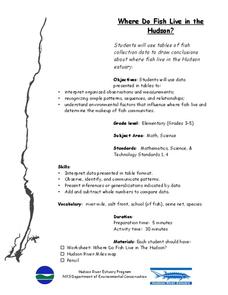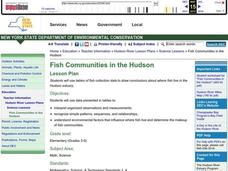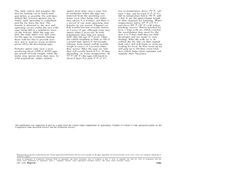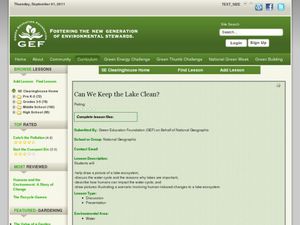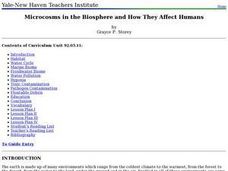Curated OER
Fish Communities in the Hudson
Learning to read data tables is an important skill. Use this resource for your third, fourth, or fifth graders. Learners will will study tables of fish collection data to draw conclusions. The data is based on fish environments in the...
Curated OER
Your Own Fresh Water Aquarium in the Classroom
Students explore aquariums. In this fish and ecosystems lessons, students establish a freshwater aquarium environment using materials provided. Students read about and care for the classroom fish.
Curated OER
Biomes: Freshwater & Seawater
Students observe organisms behavior and adaptations. In this biomes lesson students conduct fieldwork to determine water quality and answer questions about the differences between different habitats.
Curated OER
Where Do Fish Live in the Hudson?
Young scholars explore the environmental factors that influence where fish live and determine the makeup of fish communities in the Hudson. They interpret guided observations and measurements to assess patterns, sequences and relationships.
Curated OER
Fish Communities in the Hudson
Students use tables of fish collection data to draw conclusions about where fish live in the Hudson Estuary. Given available data they interpret organized observations and measurements and recognize simple patterns, sequences, and...
Curated OER
Drama from Animal Characters
Learn about animal habitats, characteristics, and writing in a different perspective. The class composes a narrative from the perspective of a fresh water animal, they include a problem and the animal's reaction to the problem. The...
Curated OER
Out of the Freshwater Aquarium
For this online quiz worksheet, students answer a set of multiple choice questions about freshwater aquarium fish. Page includes links to answers and resources.
Curated OER
'O'opu Life Cycle
Students investigate the life cycle of the 'o'opu also known as Hawaiian gobies. In this amphidromous living lesson, students discuss the reproductive cycle, create props and an obstacle course to demonstrate the importance of the...
Curated OER
Trout Are Made of Trees Crayon Mural
Students recognize that for a trout habitat to be ideal, several components must be present. In this trout lesson, students explore what makes a healthy stream. Students create paintings for a mural of a trout habitat....
Curated OER
Habitat Crossword Puzzle
For this science worksheet, students will read the clues to identify the various habitats of living creatures. Using the 18 clues, students will complete the crossword puzzle of horizontal and vertical answers.
Curated OER
Channel Catfish
Students study the life and biology of the Channel Catfish. For this aquatic biology lesson, students will examine the external and internal features of the catfish along with their breeding habits and environment. This lesson includes...
Curated OER
Can We Keep the Lake Clean?
Students are introduced to the water cycle. They help draw a picture of a lake ecosystem, adding human impacts that affect water quality. Students help fill in the components of a drawing of a water system. At the end of the lesson...
Curated OER
Aquatic Organisms and Their Habitats
Students investigate the presence of specific organisms in a freshwater habitat to determine the quality of that habitat. They conduct a field study and distinguish and classify organisms found during the field study.
Curated OER
Dream Stream
Investigate the parts of a healthy stream to build content-specific vocabulary and ecological awareness. The class builds vocabulary and determines why clean water is important for trout. They design a shoe box to show what a clean...
Curated OER
Basic Needs of Living Things - Lesson Two
Fourth graders study and identify the basic needs of a variety of organisms. Terrariums and aquariums are used to demonstrate what plants, animals, and fish need to stay alive. These two classic models are used to effectively convey what...
Curated OER
Repopulating Michigan's Waterways
Eleventh graders identify the parts of an ecosystem and how communities change over time. In this ecology lesson students formulate a habitat restoration plan.
Curated OER
The Journey of the Pacific Salmon
Students examine the journey of the Pacific salmon. In this salmon species lesson, students review the stages of the salmon life cycle and conduct an experiment to determine how the water and habitat changes during each stage.
Curated OER
The Excretory System
In this excretory system learning exercise, students read a brief excerpt about water balance and the excretory system. Then they identify what compound birds, insects and reptiles living in dry habitats excrete. Students also describe...
Curated OER
Oceanography
Second graders identify saltwater and freshwater habitats and the resources found in them. They compare and contrast the two habitats and discuss their findings. They discover the resources bodies of water can provide.
Curated OER
Kidney Structure and Function: removing intracellular waste
Your class will learn all about the function of the kidney and how it operates in animals from different habitats. The methods of absorption, filtering and excretion are detailed and pupils will learn of the different...
Curated OER
Maintaining the Internal Environment
Explore homeostasis in animals with this all-encompassing learning exercise. Advanced biology pupils consider a variety of mechanisms for maintaining internal conditions such as temperature and waste products. Eighteen short-answer...
Curated OER
Science: Microcosms in the Biosphere
In a series of lessons, examine the impact on humans by microcosms in the biosphere. Among the plans structured for young scholars with different abilities and learning styles, are activities describing the symbiotic relationship,...
Curated OER
Sprinkles 5
In this environment worksheet, students read the information and complete the survey about their own local habitats and some of the others in Florida.
Curated OER
Regions of North America: The Chesapeake Bay
In this reading comprehension instructional activity, students read an article on "The Chesapeake Bay". Students read 5 sentences and fill in each blank in each sentence with a word from the article. Students answer 3 short...





